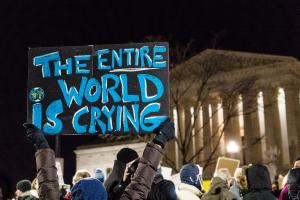
Refugees deserve to be honored and respected, given protections so that they do not suffer or become penalized due to their status. Due to the circumstances they have found themselves in, they often have to disregard the rule of law in order to survive. Just as those who have to steal food in order to survive are not culpable for theft, refugees who have to disregard border laws in order to find safety should not be held responsible for breaking the law. If some legalist demands that the law should be enforced, no matter the human cost, they show us how and why legalism runs counter to the dictates of justice and instead follow power dynamics. Refugees should not be penalized for “illegal immigration,” especially if those who would penalize them make it difficult, if not impossible, for them to receive what justice says should be given to them. And if the rule of law violates justice, then the rule of law must change, so that legalists will not be able to use law to counter the dictates of justice. It is for this reason why the United States needs to change its immigration laws, for they do not follow the expectations of justice; the Supreme Court might be correct on the technical issue of what the law and Constitution allows when they decided that the United States can deny refugees who had been granted temporary protected status the ability to receive a green card, but this only the law of the United States runs counter to morality and so should be opposed by those who promote justice.
Christians should be especially concerned with the rule of law in the United States, and how it undermines the moral expectations promoted of their faith. Scripture consistently promotes the notion that we should show hospitality to and help those who are in need, including and especially those who are “foreigners.” The Torah indicates that the People of Israel once needed help from all kinds of peoples as they went from Egypt to the promised land. Those who helped the People of Israel, following the rules of hospitality, were rewarded, while those who hindered them, indeed, those stood in their way, suffered greatly as the result of their inhospitality (see, for example, Num. 20:14-21; 21:21-35). Justice demands we help the oppressed instead of joining in on their oppression; when refugees have to flee from their homeland, we are complicit in their oppression if we do not make a way to welcome them (such as by establishing laws which make it difficult, if not impossible, for refugees to receive sanctuary and the ability to migrate to a new homeland).
St. John Paul II, while recognizing illegal immigration can be a problem, also understood that one of the issues is the way the law has been written. He said that so long as someone is in need, we should be willing to welcome them and help them instead of being concerned with the way they entered our land. And if someone in great need they violated some law in order to become a refugee, such as “illegally” crossing a border, every effort should be made to help find a charitable solution in regards their legal status:
The first way to help these people is to listen to them in order to become acquainted with their situation, and, whatever their legal status with regard to State law, to provide them with the necessary means of subsistence.
Thus it is important to help illegal migrants to complete the necessary administrative papers to obtain a residence permit. Social and charitable institutions can make contact with the authorities in order to seek appropriate, lawful solutions to various cases. This kind of effort should be made especially on behalf of those who, after a long stay, are so deeply rooted in the local society that returning to their country of origin would be tantamount to a form of reverse emigration, with serious consequences particularly for the children.[1]
While welcoming those in need, it is also important to discern the reasons why refugees are fleeing their homeland, so that it might be possible to fix the problems which turned them into refugees. For many, if not most, refugees would have preferred to stay where they came from, and would like to return to their homeland, but they will not do so as long as they feel it is not safe for them to return. Thus, we must be willing to work with refugees in a variety of ways, helping them while they are refugees, while trying to find solutions to their problems, whether or not it means helping them safely return to their homeland or finding a new homeland to live in for the rest of their lives. Pope Benedict XVI recognized this, which is why he said:
Speaking of the other category of migrants – asylum seekers and refugees – I wish to underline how the tendency is to stop at the question of their arrival while disregarding the reasons for which they left their native land.
The Church sees this entire world of suffering and violence through the eyes of Jesus, who was moved with pity at the sight of the crowds wandering as sheep without a shepherd (cf. Mt 9: 36). Hope, courage, love and “”creativity’ in charity” (Apostolic Letter Novo Millennio Ineunte, n. 50) must inspire the necessary human and Christian efforts made to help these brothers and sisters in their suffering. Their native Churches will demonstrate their concern by sending pastoral agents of the same language and culture, in a dialogue of charity with the particular Churches that welcome them. [2]
Christians, having learned that their way of life should be the way of charity, the way of love, must promote the needs of the oppressed. Thus, Christians must stand up and promote the rights of refugees (and other immigrants). When the Supreme Court (and with it, the Biden Administration) tries to use the rule of law as a way to ignore the demands of justice, then what needs to be done is to change the law. Christians must speak up to change the system, to promote what Scripture promotes, to promote the preferential option for the poor and oppressed, putting their needs above the letter of the law itself.
Borders are not meaningless, even if they are human constructs. But they are not absolutes, and we must not treat them as being more important than people. Pope Francis realizes this, which is why he says that everyone should reconsider their relationship with borders, so that they are understood as a place where we can reach out and help those in need instead of being an excuse which we can use to ignore them:
This is the ideal of the new Jerusalem (cf. Is 60; Rev 21:3), where all peoples are united in peace and harmony, celebrating the goodness of God and the wonders of creation. To achieve this ideal, however, we must make every effort to break down the walls that separate us and, in acknowledging our profound interconnection, build bridges that foster a culture of encounter. Today’s migration movements offer an opportunity for us to overcome our fears and let ourselves be enriched by the diversity of each person’s gifts. Then, if we so desire, we can transform borders into privileged places of encounter, where the miracle of an ever wider “we” can come about.[3]
The decision of the Supreme Court might, legally speaking, be correct. In it, the rule of law is followed to the letter, but the harm which is done by this is easy to see. Those in need will find their status and livelihood in question. The rule of law must change, and until it changes, those who promote justice, insofar as they see the rule of law undermines it, must deny the letter of the law, pointing out how the law itself is what is unjust. Refugees deserve better. Once they have been told they are welcome, they really should be welcomed. Anything else, and we risk suffering the consequences of our injustice.
[1] Pope St. John Paul II, “Message for World Migration Day 1996” (7-25-1995).
[2] Pope Benedict XVI, “Message for the 96th World Day of Migrants and Refugees 2006” (10-18-2005).
[3] Pope Francis, “Message for the 107th World Day of Migrants and Refugees 2021” (5-3-2021).
Stay in touch! Like A Little Bit of Nothing on Facebook.
If you liked what you read, please consider sharing it with your friends and family!













